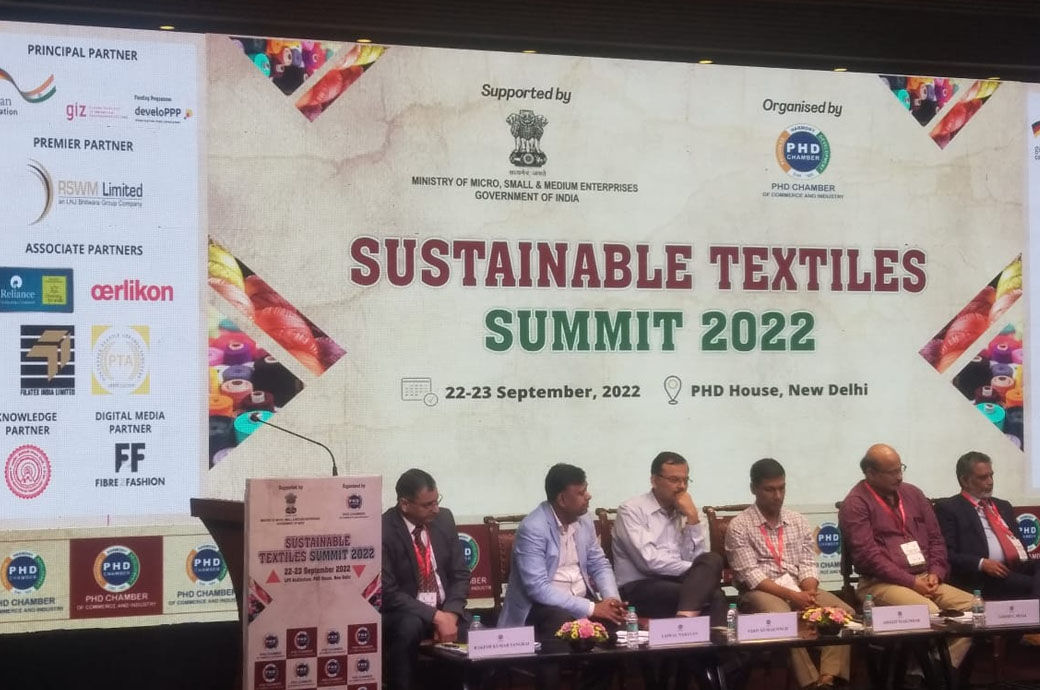
There is a need for special focus on research & development for sustainability in the textile sector. Sustainability is needed at every level in the textile industry, which is second in terms of pollution emission, Singh said at the summit organised by the PHD Chamber of Commerce and Industry (PHDCCI). The summit was supported by the ministry of micro, small and medium enterprises, while Fibre2Fashion was the Digital Media Partner.
The economic development around the world and changing lifestyle has led to the growth of the textile industry globally, but rapidly rising solid waste due to discarded clothing is creating problems for the environment. Therefore, the approach towards textiles is changing keeping in mind the environment. “Today, there is emphasis on recycling for sustainability. It allows the industry to re-produce the fibre by obtaining raw material from the previously produced clothes. This will be an important step towards reducing solid waste and net zero emissions,” Singh added.
“Till now the focus of the textile industry in India has been on cotton. But the industry should adopt man-made fibre for economic cost, competitiveness and faster growth. That is why the government had come up with the PLI scheme. Now the government is considering launching PLI-2 to promote the garment and clothing industry,” he said.
On India’s weak position in the export market as compared to the other countries, the secretary said that the government is taking several steps to assist the industry in this matter. PM MITRA scheme has been introduced to promote large scale production. PLI-2 will also be another step in the same sequence.
Vincent Duret, textile business unit manager, Ecocert Granlife SAS, France, said that global textile industry was estimated at $1.5 trillion in 2019, which will be $2 trillion in 2026. Ecocert is encouraging textile companies across the world through certification to check pollution and behave eco-friendly. His company conducts certifications to ensure sustainability in all the activities of each type of textile company. For this, the company also provides necessary assistance.
Addressing the summit virtually, Atul Bagai, India head, United Nations Environment Programme (UNEP), said that there should be a special emphasis on circularity for sustainability. The industry should act now to achieve the goal of net zero emissions by 2070. For this, efforts should be made to create awareness in the industry at every level.
Prof. RS Rangasamy, department of textile and fibre engineering, Indian Institute of Technology (IIT) - Delhi, said in his theme address that more water and chemicals are required to meet the growing demand. But the industry needs to adopt the policy of reduce, reuse and recycle to reduce pressure on the environment. It needs an innovative approach. “The government should formulate policies to encourage the industry (to go sustainable).”
Pradeep Multani, president, PHDCCI said that sustainability is the real need of the day. For this everyone will have to work together.
In the session on Recycling Textiles, NITI Aayog advisor Sudhir Kumar emphasised the need for green energy and circular economy. Partha Talukder, investment manager at Enviu, a Netherlands-based company, said that sustainability requires technology, infrastructure and skills. His company is striving to integrate the entire lifecycle of a textile product. Prof. BK Behera from the department of textile and fibre engineering, IIT Delhi, emphasised on better understanding of sustainability and R&D.
In the session on Role of Brands in Textile Sustainability, Vijay Kumar Singh, outgoing special secretary, ministry of textiles, said that brands have an important role to play in sustainability. Mohammed Shafiqur Rahman, president of Bangladesh’s Institution of Textile Engineers and Technologists (ITET) and managing director of Hems Group, said that the brands talk about sustainability, but they do not want to pay a better price for the products. “Sustainability requires investment. Only better pricing from the brands can encourage the entire upstream value chain of the sector.”
Speaking at the same session, Rohan Batra, head of Textile and Retail Sustainability, Marks & Spencer, said that brands have to face the consumer. Different challenges lie before them. “The entire value chain has to work together. But it would not be right to put full responsibility on the brands.” Prof. Abhijit Majumdar, Institute Chair, department of textile and fibre engineering, IIT Delhi, said the government has to strike a balance between interests for sustainability. “There can be regulation for this.”
Fibre2Fashion News Desk (KUL)